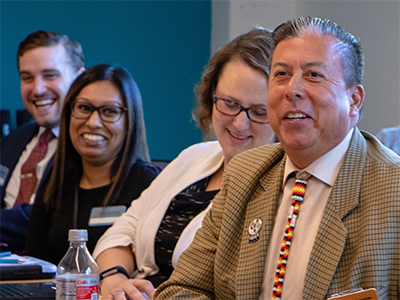Vulnerable residents of the Alaska Native Village of Newtok will soon have safe drinking water as part of a growing United Methodist commitment to Native American ministries.
The grant of nearly $1 million from the United Methodist Committee on Relief (UMCOR), approved Oct. 12, will provide 21 self-contained sanitation units for the homes of those being moved because of environmental risks posed by floods, shore erosion and melting permafrost.
Woven throughout the meeting of the United Methodist Board of Global Ministries — of which UMCOR is a part — was a focus on both the denomination's tumultuous history with native peoples and the mission agency's efforts to engage in support and education on Native American issues.
"Now we're starting to see the church being on the right side of history instead of the other side," the Rev. Chebon Kernell Jr., a Seminole and ordained elder in the Oklahoma Indian Missionary Conference, told United Methodist News Service.
The Rev. David Wilson said he has noticed changes within the denomination toward Native Americans since the adoption of the Act of Repentance in 2012.
"I like to think that it made a big difference," he said. "It's never what you want it to be, what you think it should be, but we continue to work."
 |
| During the United Methodist Board of Global Ministries' fall meeting, the Rev. David Wilson makes a presentation at a committee meeting on Native American ministries supported by The Advance, a voluntary giving program of The United Methodist Church. Photo by Jen Silver, Global Ministries. |
Native people may grow weary of telling their story over and over again, Wilson added, "but it pays off in dividends in terms of helping the church understand."
The Advance, a voluntary giving program of the church and also has projects related to Native American ministries.
But, as Kernell detailed for the board's directors, Native communities have faced peril from all segments of U.S. society. War, disease and displacement had a devastating effect on those who had occupied the land for some 16,000 years, bring a population estimated in the millions to about 240,000 today.
"We're just two steps away from not being here anymore, from being extinct," Kernell said.
Atlanta is the homeland of Muscogee and Cherokee people. Standing Peachtree is where one of the historic Muscogee villages once stood and now is the site of the City of Atlanta's Chattahoochee River Intake.
The first opportunity to take a public advocacy stance, Kemper said, was the protest over oil pipeline access across lands owned by the Standing Rock tribe.
It offered "a crucial moment," he said, to demonstrate solidarity for the protection of tribal water resources. The mission agency visited the protest site and later held a press conference at the Center for Civil and Human Rights in Atlanta.
The controversy over sports names and mascots was addressed during the meeting with a screening of "More Than a Word," co-directed by John Little from the Standing Rock Sioux Tribe and his brother Kevin. The viewing was followed by a panel discussion.
"We really wanted to have a conversation and move beyond a shouting match," he told the Global Ministries directors.
The Rev. Anita Phillips, a member of the Cherokee Nation of Oklahoma and executive director of the denomination's Native American Comprehensive Plan, has witnessed the suffering of multiple generations of Native Americans, noted that one of her questions to God has been, "How can I be a part of the healing of what's happening to my people?"
Linda Bloom, the assistant news editor for United Methodist News Service
One of six churchwide Special Sundays with offerings of The United Methodist Church, UMCOR Sunday calls United Methodists to share the goodness of life with those who hurt. Your gifts to UMCOR Sunday lay the foundation for the United Methodist Committee on Relief (UMCOR) to share God's love with communities everywhere. The special offering underwrites UMCOR's "costs of doing business." This helps UMCOR to keep the promise that 100 percent of any gift to a specific UMCOR project will go toward that project, not administrative costs.
When you give generously on UMCOR Sunday, you make a difference in the lives of people who hurt. Give now.





